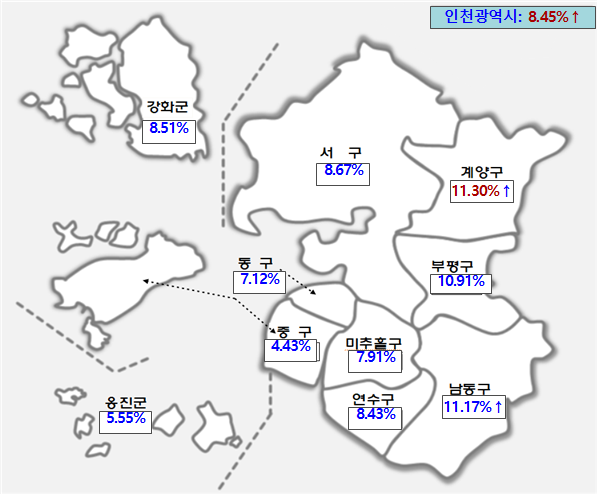
INCHEON, SOUTH KOREA – Incheon's total land area has expanded to 1,069.5 square kilometers (approximately 412.9 square miles), marking a substantial 2.4 square kilometer (around 0.9 square miles) increase compared to the previous year. This growth, revealed in the 2025 cadastral statistics released by the Ministry of Land, Infrastructure and Transport on April 1st, translates to an estimated economic value surge of 2.3 trillion Korean Won, or approximately $1.7 billion USD (based on the 2024 officially assessed land prices in adjacent areas).
The primary drivers behind this expansion are the recent completion of significant land reclamation projects within the Incheon Free Economic Zone in Yeonsu-gu. Specifically, the newly registered land includes 1.5 square kilometers in Block 11-2 and an additional 0.9 square kilometers in the port hinterland of Block 10. These strategically important areas are poised to further fuel Incheon's economic development and strengthen its position as a key logistics and business hub in Northeast Asia.
Since the initial compilation of cadastral statistics in 1970, when Incheon's total area stood at a mere 189.1 square kilometers, the city has undergone remarkable territorial growth. This expansion has been primarily attributed to continuous and ambitious land reclamation projects along its coastline and the incorporation of surrounding administrative districts.
The 2025 figures position Incheon as the second-largest among South Korea's special and metropolitan cities in terms of land area, trailing only Daegu Metropolitan City (1,499.5 square kilometers). This represents an impressive 5.6-fold increase in landmass over the past five decades, highlighting Incheon's dynamic growth and development.
An analysis of Incheon's land use distribution reveals that forests and woodlands constitute the largest share at 36.1%. Paddy fields account for 14.3%, followed by residential land at 11.2%. Combined, natural landscapes (forests/woodlands) and agricultural land (paddy fields, dry fields, orchards) occupy a significant 57.8% of the city's total area, underscoring the importance of these sectors despite rapid urbanization.
In 2024, land use trends indicated a minor contraction of 2.5 square kilometers (-0.5%) in miscellaneous land, forests/woodlands, and paddy fields. Conversely, residential land experienced a notable increase of 2.2 square kilometers (2%), reflecting ongoing urban development. Recreation and leisure areas, including parks and amusement parks, also saw a significant expansion of 1.2 square kilometers (4%), highlighting a growing emphasis on quality of life and green spaces within the city.
Over the past decade, more pronounced shifts in land use have occurred. Areas dedicated to dry fields, paddy fields, and forests/woodlands have decreased by 7.4%, 11.5%, and 3.4% respectively, as land is repurposed for urban development. In contrast, residential land, roads, and parks have witnessed substantial growth, increasing by 17.8%, 16.1%, and an impressive 87.8% respectively. This long-term trend underscores Incheon's transformation into a modern, urbanized center with expanding infrastructure and recreational facilities.
Regarding land ownership, the majority (52.4%) is held by individuals, while state and public entities own 26.6%, and corporations hold 19.1%. Over the last ten years, individual land ownership has slightly decreased by 3.6%, while state and public ownership and corporate ownership have seen increases of 11.7% and 6.8% respectively, indicating a growing role of public and private sector entities in land management and development.
Lee Cheol, Director of Incheon Metropolitan City's Urban Planning Bureau, emphasized the city's commitment to making this valuable data accessible to the public. "To ensure that citizens can easily understand and engage with these cadastral statistics, we are developing user-friendly content linked with the Incheon Metropolitan City Map Portal. This will include intuitive maps, informative photographs, and clear explanations to provide a comprehensive understanding of our city's evolving landscape," Director Lee stated.
This expansion of Incheon's land area and the corresponding increase in its economic value underscore the city's continued growth and its strategic importance within the South Korean economy. The ongoing land reclamation and evolving land use patterns reflect Incheon's dynamic development as a major metropolitan center.
[Copyright (c) Global Economic Times. All Rights Reserved.]






























